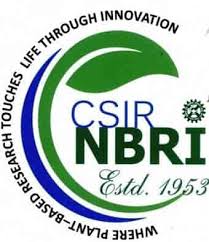
NATIONAL BOTANICAL RESEARCH INSTITUTE , LUCKNOW

Contact Information
| Contact Type | Details |
|---|---|
| Address | CSIR-National Botanical Research Institute, Rana Pratap Marg, Lucknow – 226001, Uttar Pradesh, India |
| Phone | +91-522-2297802, +91-522-2205831 |
| Fax | +91-522-2205836 |
The Council of Scientific and Industrial Research (CSIR) oversees the prestigious National Botanical Research Institute (NBRI) in Lucknow, Uttar Pradesh. The NBRI, which was founded in 1953, focuses on research in plant science, including taxonomy, conservation, genetics, and plant biotechnology. In addition, the institute studies bioresource utilization, which contributes to sustainable development and environmental preservation, as well as medicinal and aromatic plants.
Overview and Specifications Name: National Botanical Research Institute (NBRI) Address: Lucknow, Uttar Pradesh, India Established in 1953 Parent Organization: Council of Scientific and Industrial Research (CSIR), Government of India Primary Focus Areas: Plant Sciences, Conservation, Biotechnology, and Ethnobotany Website: NBRI Official Site Vision and Mission: to contribute to sustainable development and the preservation of plant biodiversity by becoming a globally renowned center of excellence in plant science.
Mission: to support economic and environmental requirements by advancing plant science research for the conservation and sustainable use of plant resources.
Core Research Areas The NBRI’s research focuses on a variety of plant science areas, particularly conservation of biodiversity, genetic improvement, and applications in biotechnology.
1. Systematics and Plant Biodiversity Research into and documentation of plant diversity, particularly medicinal, aromatic, and important to the economy plants.
Scientific categorization and recognizable proof of local plant species.
2. Conservation and Environmental Botany The preservation of biodiversity hotspots and endangered plant species.
Research on plant reactions to ecological stressors, for example, contamination and environmental change.
3. Research in Genetics and Biotechnology Genetic modification of plants for increased agricultural productivity and resistance to stress.
Utilization of biotechnology for sustainable development, such as the production of transgenic plants and tissue cultures.
4. Exploration of medicinal plants for pharmaceutical purposes in phytochemistry and pharmacognosy
Bioactive compounds are extracted and analyzed to support the creation of herbal medicines.
5. The study of indigenous knowledge and traditional plant use in relation to agriculture and healthcare is known as ethnobotany and economic botany.
Investigate sustainable farming methods and economically valuable plants.
Plant Taxonomy and Systematics is one of the departments and research divisions that focuses on plant classification and biodiversity documentation.
Plant genetics is studied in plant molecular biology, which also includes genome mapping and DNA analysis.
Natural and Ethnobotany Studies plants comparable to biology, native information, and ecological effect.
Pharmacology and phytochemistry investigate bioactive compounds in search of potential therapeutic applications.
Tissue culture and other cutting-edge methods are utilized in plant biotechnology for plant improvement.
Contributions and Major Projects Floral Diversity Documentation: Comprehensive plant species surveys and documentation in India, with a focus on economically important and endangered species.
Study of Pollution Tolerance: Phytoremediation techniques and green spaces can benefit from research on plant species that can tolerate or reduce pollution.
Research on Aromatic and Medicinal Plants: New compounds and potential herbal remedies have been identified as a result of studies on medicinal plants.
Herbarium of the Nation: establishing and maintaining a large herbarium with thousands of plant specimens for reference.
Public Outreach and Botanical Gardens: The botanical garden of the NBRI houses a variety of plant collections and serves as a public educational and research facility.
Infrastructure and Botanical Gardens The NBRI Botanical Garden is a prominent component of the institute that is used for a variety of purposes, including public education and conservation research.
Description of the Feature The Botanical Garden is home to a wide range of plants, including exotic, medicinal, and aromatic varieties.
The vast collection of preserved plant specimens in the herbarium is used for taxonomic research.
Facilities for genetic and biotechnological plant research in tissue culture labs.
Resources on pharmacology, taxonomy, biotechnology, and botany can be found in the extensive research library.
Field and in vitro gene banks for the preservation of plant biodiversity are conservation facilities.
Academic Programs and Training The NBRI provides opportunities for collaborative research as well as training programs with the goal of enhancing expertise in botany and plant sciences.
The Ph.D. program focuses on research in genetics, biotechnology, and plant taxonomy.
Postdoctoral Fellowships Programs for advanced research for Ph.D. graduates.
Internships and Training Programs Practical instruction in conservation, biotechnology, and plant taxonomy.
Partnerships with universities and other institutions for joint research are called collaborative projects.
Partnerships and Collaborations The National Biodiversity Research Institute (NBRI) has formed domestic and international partnerships to propel conservation and research efforts. Key partnerships include:
The Indian Council of Agricultural Research (ICAR) conducts crop improvement and genetics research.
for academic exchange and collaborative projects with other academic institutions, including the University of Lucknow.
Pharmaceutical and biotech industries for plant-based product development and bioprospecting.
For collaborative research on global plant biodiversity, international botanical institutes, like the Royal Botanic Gardens in Kew.
Outreach and Public Participation The NBRI actively participates in programs that promote environmental conservation and plant science. Among the activities are:
Seminars and Workshops: Events on sustainable agriculture, biodiversity, and medicinal plants on a regular basis.
Programs for Public Awareness: Educational initiatives to encourage sustainable practices and conservation of the environment.
Outreach to Schools and Colleges: introducing young students to plant science through interactive sessions, educational tours, and lectures.
Address CSIR-National Botanical Research Institute, Rana Pratap Marg, Lucknow – 226001, Uttar Pradesh, India Phone: +91-522-2297802, +91-522-2205831 Fax: +91-522-2205836 Email: director@nbri.res.in Website: NBRI Official Site Future Plans
The NBRI intends to broaden the scope of its research by:
Promoting Climate-Resilient Crop Research: cultivating climate-resistant crop varieties for improved agriculture.
Increasing Ethnobotanical Research: preserving indigenous wisdom and incorporating it into current methods of sustainable agriculture and healthcare
New Initiatives in Bioprospecting: exploring plants with medicinal and commercial value for the creation of new bioproducts.
Intensive Conservation Work: expanding in- and ex-situ conservation programs to safeguard biodiversity, particularly endangered species.
Courses/Programs
| Serial# | Title | Estimated Cost | Program type |
|---|
